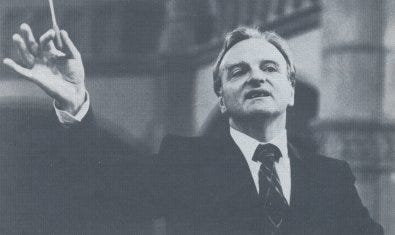March 18: Cantatas (BWV 96, 5, 56, 180, 38, 55, 115, 139); Münchener Bach-Orchester; Karl Richter, conductor.
Like what you like, it's fine.
One of my favorite books of music criticism is “Let’s Talk About Love,” Carl Wilson’s quasi-memoir about his indignation that Elliot Smith lost to Celine Dion at the Oscars. Carl loved Elliot, the world loved Celine (and “Titanic”), and the world was obviously wrong. The twist comes after Carl engages with Celine’s fans. He realizes they seek the same emotional experiences through music that he does, just ones of a different flavor. Smith’s unnerving songs of beautiful agony provided Carl consolation and sympathy; Celine’s songs envelop her fans in grand and sweeping emotions, and provide nostalgia for their own lives — remember your date to “Titanic”?
I’d choose Smith over Dion, but I also choose Karl Richter over Masaaki Suzuki as my preferred Bach cantata conductor. In certain circles this makes me a historically uninformed rube/fuddy-duddy. (In most circles, no one knows/cares what I’m talking about.) Suzuki is a scholar who has helped rediscover how these pieces were played in Bach’s time. I find Suzuki’s interpretations often lifeless, even if they probably align closer to Bach’s intentions. Richter interprets with big, sweeping romantic (and Romantic) gestures. He’s my Celine! No shame. Here’s Karl:

Today I’m writing about Cantatas BWV 96, 5, 56, 180, 38, 55, 115, and 139 from the second volume of the “Sundays After Trinity” recordings by the Münchener Bach-Orchester conducted by Richter on the Archiv label, recorded between 1959 to 1979. (I listened on Apple Music; I had trouble finding this collection on Spotify; many of these can be found on Youtube here, or through Presto.)
Here are lots of highlights:
The opening of BWV 55 has some Ren-faire vibes, but twenty seconds in, Bach clears his throat and demonstrates how far his genius has advanced the music:
The second movement of BWV 115 has a big and dark and ominous opening section, my home mood:
BWV 5 opens with an organ chord, then the organ drops and Bach spitfires counterpoint, and then the organ whomps back in with a huge chorus. So many lines! Deep stuff ahead:
In the third movement of BWV 5, we get beautiful extended phrases from blog favorite Peter Schreier:
In the fourth movement of BWV 180, Richter takes it very slow, letting our alto Trudeliese Schmidt draw out these phrases. This feels so open:
Here’s a great little chord surprise in the last 15 seconds of BWV 96:
BWV 38 is one of the weirder cantata’s I’ve heard so far. It has an outrageous and ballsy opening, starting at the second note. We’re off kilter and then we suddenly resolve, what just happened:
Later in that movement, there’s material that I don’t understand at all — it’s not bad, I’m just confused and would need to sit in hours of lectures to unpack it. Score excerpt begins at 0:06 of the clip for your pleasure:
The opening line for the soprano in movement 4 seems very hard to sing, especially that opening interval from Bb to G. Edith Mathis does very well here:
The renowned singer Dietrich Fischer-Dieskau is featured on some of these sessions. He sort of sounds like Headmaster Dietrich in BWV 139.
The endings of these cantatas are usually crisp and tight, but Richter (and I) offer you a haunting, Schubert-esque ending to BWV 56, “Komm, o Tod, du Schlafes Bruder”:
Come, o death, brother of sleep,
come and lead me away;
release the rudder of my little ship,
bring me to the secure harbor!
He may shun you who will,
you can delight me much more;
for through you I will come
to my loveliest little Jesus.
A Year of Bach is going on a Week of Vacation — see you all in the last week of March.






